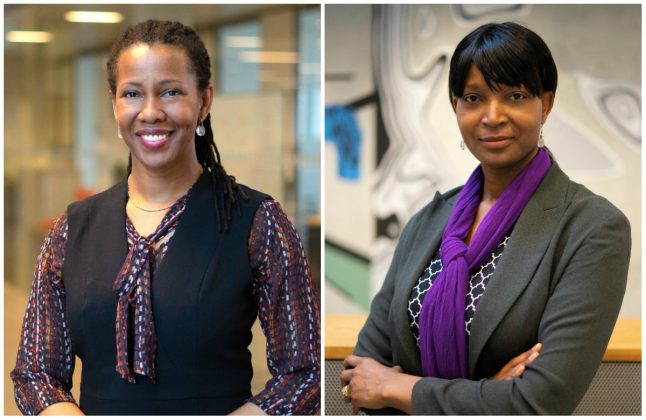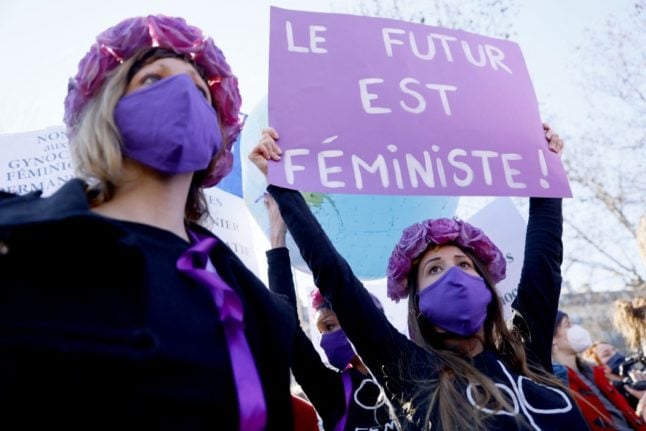We spoke to the founders of the organisation about their professional and societal experiences in Denmark.
READ ALSO: Here's where Denmark's foreign residents live and where they come from
ProWoc is a non-profit organisation that offers career and personal development opportunities for professional women of colour seeking to increase their visibility and impact, according to the NGO’s website.
Co-founder Selim Ablo-Nielsen is originally from Ghana and has lived in Denmark since 2008.
“What inspired me to start ProWoc was the desire to empower women and the need for positive images of women of colour in the public. It was essential to have more role models for children given the sometimes the negative public discourse and media images,” Ablo-Nielsen told The Local.
Ablo-Nielsen, a lawyer who has a Danish spouse and children who were brought up in Denmark, works at a Danish pharmaceutical company as a senior compliance counsel.
Phaedria St Hilaire, who comes from the Commonwealth of Dominica in the Caribbean, has lived in Denmark since 1995. Like Ablo-Nielsen, she has a Danish spouse and lives in Copenhagen with her family. She works at a Danish pharmaceutical company as Director of CMC Outsourcing.
“Selim had this idea of starting a network to encourage and empower professional women of colour and I agreed that there is a dearth of role models, especially for the second-generation kids of colour, besides, helping women in navigating the Danish job market was necessary,” St Hilaire told The Local.
In addition to her work with ProWoc, St Hilaire also spends time informally mentoring and helping women and immigrants who need guidance in navigating the Danish society and job market.
Ablo-Nielsen said she found Denmark’s professional sphere had a need for an organisation focused on helping professional women of colour, in particular, with advancing their careers, strengthening their networks and promoting positive images of women of colour by raising their profile.
“I realised that I couldn’t keep waiting for someone else to act, and needed to do something about it. The final catalyst was when I had reached out to a popular media outlet in 2018 about portrayals of immigrants in the Danish media, and challenged them to show more positive stories about immigrants who are well-educated or highly skilled and making contributions to Denmark. They rejected my suggestion that the portrayals were often negative. I also reached out to a former politician who was supportive,” she recounts.

An older photo of ProWoc's founding members. Photo: supplied
St Hilaire adds another angle to the reason why ProWoc was formed.
“Let’s face it. Women of colour tend to be marginalised, stereotyped, overlooked and under-utilised in many predominantly Caucasian societies over the world and Denmark is no exception,” she explains.
“Danish females are quite empowered, well-represented in politics and enjoy a low gender pay gap, the same cannot be said of women of colour who live in Denmark. Most are in low paying jobs (even highly educated ones) and there is a dearth of women (or rather persons) of colour role models in Denmark,” she says.
Other organisations for women do exist in Denmark, providing a support platform for women of diverse backgrounds as well as for those whose heritage is Danish.
These include the Women’s Council in Denmark (Kvinderådet), the Danish Women's Society (Dansk Kvindesamfund) and Kvinfo.
“Sure, there are many professional networks for women in Denmark. However, I feel that ProWoc offers a unique shared experience for women of colour, provides a safe and nurturing space for them to network and share and at the same time provides concrete, hands on programs to support the personal and career development of women of colour,” St Hilaire said.
Besides women like Selim and Phaedria, the organisation also encourages Danish WoC to join. Danish women of colour have their own unique experience in Denmark.
********************
Fie Wolff, 23, works in the social care sector in Slagelse. She was adopted from India by a loving Danish family when she was 3 years old. Wolff has no affiliation with ProWoc.
She recounts her childhood and says it was difficult.
“My classmates, who were kids themselves, called me names and even asked me to go back to where I came from. Some of them even thought that they would get my brown skin colour on them if they even touched me,” Wolff says.
“I was brought up with a very Danish upbringing. I consider Denmark to be my country and consider myself to be Danish. In one of my first jobs, I faced racial discrimination by a bunch of customers who did not want to be served by me. I had a supportive boss who handled the customers while checking up on me if I was doing ok,” she told The Local.
“Even today I get the occasional stares from people while travelling or walking my dog. But, I have learnt to look past it and be comfortable in my own skin,” Wolff recounts.
********************
If ProWoc is needed to provide ethnic minority women a safe and secure platform outside of the existing organisations, how does this reflect Danish society and its treatment of this group?
“I do not think the society consciously places obstacles. Speaking Danish is an important step to being integrated and contributing to a society.
“However, when the government imposes relatively high fees to learn the language, it can impede the transition and ‘hire-ability’ of a woman of colour,” St Hilaire says.
READ ALSO: Are Danish language lessons worth 12,000 kroner? Here’s what The Local readers think
“Speaking the language is an advantage. In my earlier years, the lack of Danish language was stated in some of the rejection letters I received,” Ablo-Nielsen adds.
But as others will attest, language is not the only obstacle to crossing the intercultural space in Denmark.
“Once I left my home country of Dominica to study to become a woman in STEM [Science, Technology, Engineering and Mathematics, ed.], I have often been the ‘only’ one or the ‘different’ one so experiencing that in Denmark is nothing new and I don’t allow it to hold me back,” St Hilaire says.
“The biases and different treatments (in Denmark) are more subtle. I would classify them into two categories. First is the classic, more is expected of you than others,” she says.
“When I walk into a meeting with my white male or female employees, often the expectation is that they are the senior authority. I have been asked to get coffee by some colleagues because it is missing from the coffee machine – the implication being you are only in these offices as a cleaner or service provider, a fitting profession for a person of colour,” she continues.
“On the other hand, there are some who seem enthralled and bemused by your presence and wit and intelligence that everything you do is fantastic and you could not possibly do more. That is not ideal in the long run,” St Hilaire explains.
“There are many ambitious and hard-working professional women of colour in Denmark with valuable skills, experiences, and stories to share. I believe that representation matters and our organisation, ProWoc, seeks to highlight and increase the visibility of a community of talented women of colour professionals. I believe that Danish society benefits when their talents and potential are utilised to the fullest,” Ablo-Nielsen offers.
ProWoc has programmes and events aimed at various aspects of development as well as supporting a process of continuous improvement for its members.
“One of our fundamental offerings is career development where our members receive hands on training in a variety of areas e.g. tailoring a CV to the Danish market in order to get that interview; interviewing and negotiating skills, professional social media training. Last month we launched our mentoring program,” St Hilaire says.
The organisation also aims to give the opportunity to connect with like-minded women, enhance career opportunities, build relationships, expand networks and boost professional profiles.
“We are working to become a well-recognised organisation with a large diverse and inclusive membership. We wish to help all those who share our vision of inclusion and equal opportunities by creating awareness and solutions on issues of diversity and inclusion of persons of colour in the Danish and Scandinavian societies,” St Hilaire says.
She lists her advice is for women, especially those who are new to Denmark, as: be curious and open-minded; learn the language; get a mentor, figure out which Danish customs you want/need to adopt; but do not lose yourself.
Ablo-Nielsen’s advice is to “be open to learning new things, including the language and culture. Be brave and take action to realise your full potential.”
What has been your experience as a female person of colour or foreign resident in Denmark? Let us know your perspective– we’d love to hear your thoughts.
Happy International Women’s Day from The Local to all of our readers.
Divya Rao is a marketing and communications specialist of 12 years. She moved from her job at Microsoft to Næstved in 2018, to follow her heart. She now works as a freelance marketing and communications professional and is a contributing writer with The Local. She currently lives in Næstved and travels across the region for project implementations. You can find her on LinkedIn or via email.



 Please whitelist us to continue reading.
Please whitelist us to continue reading.
Member comments